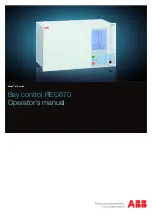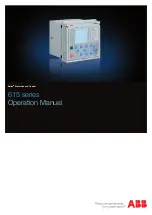
Vision™ OPLC™
Unitronics
5
Wiring
Do not touch live wires.
Install an external circuit breaker. Guard against short-circuiting in external wiring.
Use appropriate circuit protection devices.
Unused pins should not be connected. Ignoring this directive may damage the device.
Double-check all wiring before turning on the power supply.
Caution
To avoid damaging the wire, do not exceed a maximum torque of 0.5 N·m (5 kgf·cm).
Do not use tin, solder, or any substance on stripped wire that might cause the wire
strand to break.
Install at maximum distance from high-voltage cables and power equipment.
Wiring Procedure
Use crimp terminals for wiring; use 3.31 mm ² –0.13 mm² wire (12-16 AWG):
1. Strip the wire to a length of 7±0.5mm (0.270–0.300“).
2. Unscrew the terminal to its widest position before inserting a wire.
3. Insert the wire completely into the terminal to ensure a proper connection.
4. Tighten enough to keep the wire from pulling free.
Input or output cables should not be run through the same multi-core cable or share
the same wire.
Allow for voltage drop and noise interference with I/O lines used over an extended distance.
Use wire that is properly sized for the load.
The controller and I/O signals must be connected to the same 0V signal.
I/Os
V130/V350/V130J/V350J/V430J-TA24 models
comprise a total 12 inputs, 10 digital outputs and 2
analog outputs.
Input functionality can be adapted as follows:
All 12 inputs may be used as digital inputs. They may be wired in a group via a single jumper
as either npn or pnp.
In addition, according to jumper settings and appropriate wiring:
- Inputs 5 and 6 can function as either digital or analog inputs.
- Input 0 can function as a high-speed counter, as part of a shaft-encoder, or as a normal
digital input.
- Input 1 can function as either a counter reset, normal digital input, or as part of a
shaft-encoder.
- If input 0 is set as a high-speed counter (without reset), input 1 can function
as a normal digital input.
- Inputs 7-8 and 9-10 can function as digital, thermocouple, or PT100 inputs; Input 11 can also
serve as the CM signal for PT100.






























